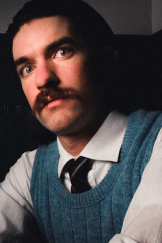In Anne Bertram’s The Good Fight, Babes With Blades invites the audience into a true story of women struggling for liberation in the face of brutal oppression by a male-supremacist regime. This story is a necessary one and offers valuable insights into our present social and political moment. From this reviewer's perspective, it does not always live up to its full dramatic potential, but when it does, it shines.
Votes and Violence
The Good Fight shows how women in the United Kingdom fought for the right to vote at the beginning of the twentieth century, leading up to World War I. Director Elizabeth Lovelady, production manager Samantha Barr, and especially fight choreographer Gaby Labotka make the stakes of this struggle painfully clear. As the government uses the police force to try to silence the Women's Social and Political Union and imprisons and tortures members thereof, the women of the WSPU form a special cohort to defend themselves and especially their targeted leaders—with force when necessary.
The mix of tactics these suffragettes employ give rise to personal ethical dilemmas and schisms between comrades. Some believe peaceful lobbying and propagandizing are the only acceptable routes, while others think targeted destruction of property is necessary to help the cause. Some believe smashing windows and bombing empty buildings are fine, but burning down a church (even an uninhabited one) is a bridge too far.
In the most devastating disagreement, old friends Harriet Kerr (Delia Ford) and Emmeline Pankhurst (Jean Marie Koon) part ways over the latter’s decision to halt Union activity and support the British military effort in the Great War in a bid to win over powerful political allies. Kerr, on the other hand, believes that the battle for the vote must remain their immediate priority and that to participate in the war effort is to be complicit in bloodshed. Both make persuasive points, and neither walks away from the split unwounded.
Episodic Structure Favors History Over Story
By telling the story of the WSPU in vignettes beginning with Christabel Pankhurst’s flight to France and ending with women’s enfranchisement in the UK, Babes With Blades gives an admirably clear-eyed history of the militant suffragettes. However, at least in this writer's view, this clarity comes at the expense of a single strong narrative.
Various characters, including morally conflicted WSPU leader Grace Roe (Arielle Leverett); silver-tongued founder Pankhurst; and chorus girl-turned-freedom fighter Hilda (C. Jaye Miller) get their time in the spotlight. Indeed, there is no shortage of vivid personalities with compelling stories. You too may end up thinking that the script juggling all of them, though, gives a certain choppy feeling as they jump between months and years.
Though this reviewer would have loved this latest show from Babes With Blades to be smoother, more cohesive, it's also clear that the acting and design elements are strong, and the production shines a light on an obscure yet fascinating chapter in the suffrage struggle. The Good Fight might not be everyone’s cup of tea, but fans of history, ethics, and jujutsu have reason to be excited.
SOMEWHAT RECOMMENDED
When:
Now through Saturday, February 17
Thursdays @ 8:00PM
Fridays @ 8:00PM
Saturdays @ 8:00PM
Sundays @ 3:00PM
Where:
City Lit Theater
1020 W. Bryn Mawr Ave.
Chicago, IL 60660
Photos: Joe Mazza
Tickets:
General Admission $25.00
Student/Senior $15.00
For tickets call 773-904-0391 or visit Babes With Blades.
Audience Alert:
This production uses realistic staged violence in the telling of the story, including a gunshot.
Full Disclosure:
The author of this review is a personal friend of dramaturg Kenya Ann Hall and has a keen professional interest in her work.
Note: An excerpt of this review appears in Theatre in Chicago
 About the Author:
About the Author:
Harold Jaffe is a poet, playwright, amateur trapeze artist, freelance greeting card designer, and pie deliveryman. He earned a BS in Electrical and Computer Engineering at Olin College with a concentration in Poetry at Wellesley College. Since returning to Chicago, he has worked extensively with Cave Painting Theater Company, where his and Gwen Kelly-Masterton's play The Land of Never-Lack was produced in Spring of 2016, as well as with the Old World Theatre Company and the late great Oracle Productions. Some of his writing can be found at haroldjaffe.tumblr.com and in his chapbook Perpetual Emotion Machine, now available at Women & Children First.
Click here to read more Picture this Post reviews by Harold Jaffe.








